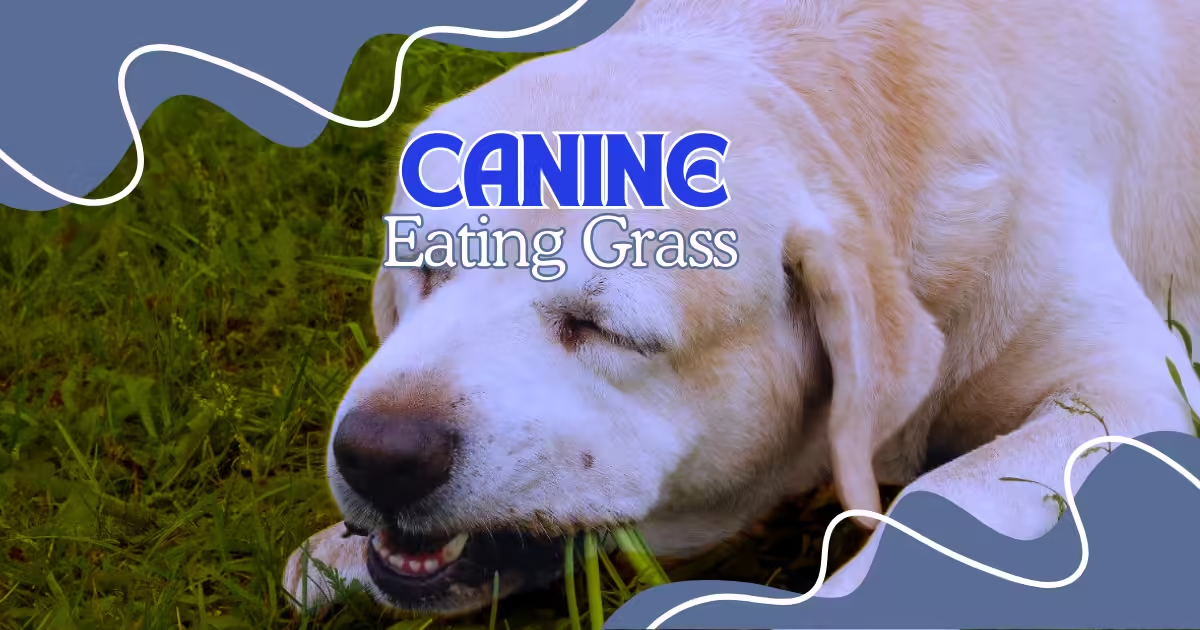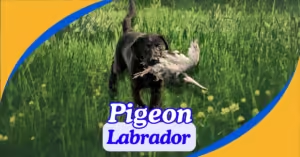If you’ve ever noticed your dog nibbling on grass, you’re not alone. Canine eating grass is a behavior that has puzzled many dog owners. While it may seem strange, it’s more common than you might think. But why do dogs eat grass? Is it a cause for concern? In this post, we’ll dive into the 5 surprising reasons why canines eat grass, explore the science behind it, and help you understand whether you should be worried about your furry friend’s grassy snack habits.
Canine Eating Grass: Is It Normal Behavior?
One of the first questions that come to mind when seeing a dog munch on grass is, “Is this normal?” The answer is yes—canine eating grass is a relatively normal behavior. In fact, studies suggest that up to 80% of dogs exhibit grass-eating behavior at some point in their lives. While some dogs graze on grass occasionally, others seem to do it more frequently.
Many experts believe that grass-eating is a part of a dog’s instinctual behavior. In the wild, canines would occasionally consume plants as part of their diet, so this behavior may be inherited from their ancestors. Although it can seem strange to pet owners, grass eating is typically harmless and does not necessarily indicate any underlying health problems.
Why Do Dogs Eat Grass? The Science Behind It
There are several theories that attempt to explain why dogs eat grass. While there isn’t a single definitive answer, here are the most common reasons behind this behavior:
1. Instinctual Behavior
Grass eating may simply be a part of your dog’s natural instincts. Wild canines, such as wolves, are known to consume plant material in addition to meat. This behavior could be a throwback to the days when dogs had to forage for food in the wild.
2. Digestive Aid
Some experts believe that dogs eat grass to aid digestion. Grass is fibrous and may help stimulate the digestive system, particularly in dogs that are experiencing mild gastrointestinal discomfort. While this theory has not been conclusively proven, it’s possible that grass helps dogs relieve bloating or indigestion.
3. Inducing Vomiting
One of the most popular theories is that dogs eat grass to make themselves vomit. If a dog is feeling nauseous or has an upset stomach, they may eat grass to help induce vomiting and expel whatever is causing the discomfort. While not all dogs vomit after eating grass, some do, supporting this theory.
4. Nutritional Deficiency
Another theory suggests that dogs eat grass to compensate for nutritional deficiencies. For instance, if a dog is lacking fiber or certain nutrients in their diet, they may turn to grass as a supplement. However, most dogs on balanced, commercial diets should be getting all the nutrients they need, making this theory less likely for well-fed pets.
5. Boredom or Anxiety
Some dogs eat grass out of boredom or anxiety. If a dog is left alone for long periods or doesn’t get enough mental stimulation, they may turn to behaviors like grass eating to pass the time or relieve stress. This is particularly common in dogs that do not get enough exercise or attention.
Does Eating Grass Make Dogs Sick? What You Need to Know
A common concern among pet owners is whether grass eating will make their dog sick. The answer depends on the individual dog and the type of grass they’re eating. In many cases, dogs will eat grass and experience no negative side effects. However, some dogs may vomit shortly after eating grass, especially if they’ve eaten large amounts or are already feeling nauseous.
If your dog vomits after eating grass, it could be their way of clearing out something in their stomach that’s causing discomfort. While occasional vomiting after grass consumption isn’t usually cause for concern, frequent vomiting or other symptoms like diarrhea or lethargy should be taken seriously. In such cases, it’s a good idea to consult a veterinarian to rule out underlying health issues.
Should You Worry If Your Dog Eats Grass?
Most of the time, canine eating grass is harmless, and there’s no need to worry. However, there are a few scenarios where grass eating could be cause for concern:
- Toxic Plants: If your dog is grazing in areas where toxic plants or chemicals (such as fertilizers or pesticides) have been used, there is a risk of poisoning. Always ensure that the grass your dog eats is free from harmful substances.
- Frequent Vomiting: If your dog frequently vomits after eating grass or shows other signs of illness (such as lethargy, diarrhea, or loss of appetite), it’s important to consult a vet to rule out gastrointestinal problems.
In general, occasional grass eating is not a problem, but keeping an eye on your dog’s overall health and behavior is key to ensuring their well-being.
Is Grass Eating a Sign of Nutritional Deficiency in Dogs?
One theory about why dogs eat grass is that they may be trying to fill a gap in their diet. Specifically, some experts suggest that dogs may consume grass if they’re lacking certain nutrients, such as fiber or trace minerals. However, this is unlikely for most dogs on a well-balanced, commercially-prepared diet.
Modern dog food is formulated to meet all of a dog’s nutritional needs, so grass eating is not typically linked to deficiencies. If you are concerned that your dog’s diet is lacking in nutrients, it’s always best to consult with your veterinarian for advice on food options or supplements that can ensure your dog is getting everything they need.
How to Stop Your Dog From Eating Grass
If your dog’s grass-eating habits are causing concern or if you simply want to reduce this behavior, there are several steps you can take:
- Provide a Balanced Diet: Make sure your dog is eating a high-quality, nutritionally balanced diet that meets all of their needs. This reduces the likelihood that they are seeking grass for additional nutrients.
- Increase Exercise and Mental Stimulation: Dogs that are bored or anxious may eat grass to occupy themselves. Providing more physical exercise and engaging activities, such as puzzle toys, can help reduce boredom-related grass eating.
- Supervise Outdoor Time: Keep an eye on your dog while they’re outside to prevent them from grazing on grass. If necessary, leash them during walks or create a designated area in your yard where grass eating is discouraged.
- Offer Safe Alternatives: If your dog seems to enjoy nibbling on plants, you can offer safe alternatives like chew toys or edible dog grass that is specifically grown for pets.
Can Eating Grass Be Dangerous for Canines?
In most cases, grass eating is harmless for dogs. However, there are certain risks to be aware of. Some types of grass or plants may be treated with pesticides, fertilizers, or herbicides, which can be toxic to dogs. Always ensure that your lawn is free from harmful chemicals, and avoid letting your dog graze in areas where toxic substances may have been used.
In addition to chemicals, sharp blades of grass or foreign objects in the grass could pose a choking hazard or cause injury to your dog’s digestive system. If your dog regularly eats grass, it’s a good idea to keep an eye on their stool and monitor them for any signs of discomfort or injury.
When to See a Vet: Grass Eating and Dog Health Concerns
In most cases, occasional grass eating doesn’t require a trip to the vet. However, there are certain situations where professional advice is necessary:
- Frequent Vomiting: If your dog vomits frequently after eating grass, it could indicate an underlying health issue, such as gastrointestinal distress or food allergies.
- Lethargy or Loss of Appetite: If your dog shows additional signs of illness (such as lethargy, diarrhea, or loss of appetite), you should consult a vet to rule out potential health problems.
- Ingestion of Toxic Plants: If you suspect your dog has consumed grass treated with harmful chemicals or eaten a toxic plant, contact a veterinarian immediately.
When in doubt, it’s always better to err on the side of caution and seek professional advice if your dog’s grass-eating behavior seems unusual.
Conclusion: Understanding Why Canines Eat Grass
In conclusion, canine eating grass is a fairly common and typically harmless behavior. While there are several possible explanations—ranging from natural instincts to digestive aid—it’s generally not something to worry about. However, it’s always important to monitor your dog for any signs of illness, ensure they’re eating a balanced diet, and keep them away from harmful substances like pesticides and toxic plants.
If your dog’s grass-eating habits seem excessive or are accompanied by other symptoms, consulting a veterinarian can provide peace of mind and help ensure your furry friend stays healthy.
FAQs About Canine Eating Grass
- Why do dogs eat grass?
Dogs eat grass for various reasons, including instinct, digestive aid, boredom, or even to induce vomiting. - Is it safe for dogs to eat grass?
In most cases, grass eating is safe, but it’s important to ensure the grass is free from chemicals like pesticides or herbicides. - Does eating grass make dogs sick?
Some dogs may vomit after eating grass, but occasional vomiting is usually not a concern. Frequent vomiting should be checked by a vet. - Is grass eating a sign of nutritional deficiency?
It’s unlikely, especially if your dog is on a balanced diet. However, consulting a vet can help if you’re concerned about your dog’s nutrition. - How can I stop my dog from eating grass?
Providing a balanced diet, more exercise, and mental stimulation can help reduce grass-eating behavior. You can also supervise outdoor time. - Can eating grass hurt my dog?
Grass itself is usually harmless, but chemicals or sharp objects in the grass could pose risks. Be sure to monitor your dog’s environment. - Why do some dogs vomit after eating grass?
Some dogs eat grass to induce vomiting if they feel nauseous or have an upset stomach. - Is eating grass a sign that my dog is sick?
Not necessarily, but if your dog is frequently sick or shows other symptoms like lethargy, you should consult a vet. - Does grass help with a dog’s digestion?
There’s no definitive proof, but some experts believe grass could help stimulate digestion in dogs with mild stomach discomfort. - Should I be concerned if my dog eats grass every day?
Occasional grass eating is normal, but if it becomes a daily habit or is accompanied by symptoms like vomiting or diarrhea, consult your vet.

Joseph Bush is a seasoned writer and researcher with over 7 years of experience covering a wide range of general topics, from lifestyle and technology to business and current events. He is dedicated to producing fact-checked, reader-friendly content that informs, engages, and empowers readers.
Throughout his career, Joseph has followed strict editorial guidelines, relied on reputable sources, and ensured every article meets the highest standards of accuracy and clarity. His expertise spans multiple fields, allowing him to explain complex topics in a way that’s easy to understand.
Passionate about continuous learning, Joseph stays updated on industry trends and best practices to deliver trustworthy, well-rounded insights. Readers can rely on his work for its credibility, depth, and real-world relevance.




